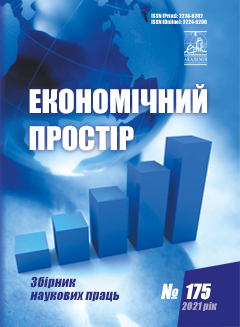МЕТОДОЛОГІЧНІ ЗАСАДИ ТЕОРІЇ ДЕЦЕНТРАЛІЗАЦІЇ: РЕТРОСПЕКТИВНИЙ АНАЛІЗ
Анотація
У статті проаналізовано історію становлення й розвитку теорії децентралізації як хронологічну послідовність трьох етапів, а саме політичного, адміністративного та економічного. Політичний етап (із початку ХІХ ст. по 1918 р.) автори характеризують розглядом децентралізації як принципу організації влади в межах країни та вагомого фактору демократизації суспільства. На другому етапі (1918 р. – кінець 60-х рр. ХХ ст.) наголошується на увазі науковців до особливостей децентралізації як раціонального та ефективного алгоритму здійснення публічного управління, її можливості та обмеження. Третій етап (60-і рр. ХХ ст. – сьогодні) автори статті визначають як розуміння децентралізації передусім в аспекті матеріально-фінансового забезпечення реалізації ефективного перерозподілу владних повноважень між органами центрального та місцевого рівнів та пошуком конкретних економічних моделей цього забезпечення.
Посилання
Гройсман В.Б. Структурно-функціональна роль децентралізації влади у процесах становлення громадянського суспільства. Ефективність державного управління. 2015. Вип. 44 (1). С. 221–229. URL: http://nbuv.gov.ua/UJRN/efdu_2015_44%281%29__29 (дата звернення: 25.08.2021).
Де Токвиль А. Демократия в Америке / пер. с фр. ; предисл. Г.Дж. Ласки. Москва : Прогресс, 1992. 575 с.
Leroux R. Maurice Block on “Decentralization”. French Liberalism in the 19th Century: An Anthology. Routledge, 2012. Р. 255–258.
Еллинек Г. Общее учение о государстве / вступ. статья И.Ю. Козлихина. Санкт-Петербург : Юридический центр «Пресс», 2004. 752 с.
Классики теории государственного управления: американская школа / под ред. Дж. Шафритца, А. Хайда. Москва : изд-во МГУ, 2003. 800 с.
Вильсон В. Наука государственного управления. Классики теории государственного управления: американская школа / под ред. Дж. Шафритца, А. Хайда. Москва : изд-во МГУ, 2003. С. 24–43.
Уиллоуби У.Ф. Движение к бюджетной реформе в США. Классики теории государственного управления: американская школа / под ред. Дж. Шафритца, А. Хайда. Москва : изд-во МГУ, 2003. С. 51–56.
Уайт Л.Д. Введение в науку государственного управления. Классики теории государственного управления: американская школа / под ред. Дж. Шафритца, А. Хайда. Москва : изд-во МГУ, 2003. С. 63–74.
Капогузов Е.А. Роль кейнсианских идей в эволюции парадигм государственного управления. Историко-экономические исследования. 2017. Т. 18. № 2. С. 244–256.
Кейнс Дж.М. Избранные произведения / пер. с англ. ; сост. А.Г. Худокормов. Москва : Экономика, 1993. 540 с.
Кауфман Г. Административная децентрализация и политическая власть. Классики теории государственного управления: американская школа / под ред. Дж. Шафритца, А. Хайда. Москва : изд-во МГУ, 2003. С. 380–396.
Tiebout Ch. An Economic Theory of Fiscal Decentralization. Public Finances: Needs, Sources, and Utilization / Universities-National Bureau Committee for Economic Research. URL: http://www.nber.org/chapters/c2273.pdf (дата звернення: 26.08.2021).
Холодов А.С., Косенко С.Т. Гипотеза Тибу и возможности ее реализации. Студенческий научный форум : материалы IV Международной студенческой электронной научной конференции. Санкт-Петербург, 2012. URL: http://www.rae.ru/forum2012/213/1335 (дата звернення: 30.08.2021).
Oates W. Toward a second-generation theory of fiscal federalism. International Tax and Public Finance. 2005. № 12. P. 349–373.
Стале ендогенне зростання регіонів України в умовах децентралізації : монографія / за ред. І.З. Сторонянськоъ. Львів : ДУ «Інститут регіональних досліджень імені М.І. Долішнього НАН України», 2019. 501 с.
Stigler G.J. The Theory of Economic Regulation. Bell Journal of Economics and Management Science. 1971. № 2. Р. 3–21.
Hroisman V.B. (2015) Strukturno-funktsionalna rol detsentralizatsii vlady u protsesakh stanovlennia hromadianskoho suspilstva [Structural and functional role of decentralization of power in the processes of formation of civil society]. Efektivnist derzhavnogo upravlinnya. 2015. № 44 (1). Р. 221–229. URL: http://nbuv.gov.ua/UJRN/efdu_2015_44%281%29__29 (accessed 25.08.2021).
Tokvil Aleksis de (1992) Demokratiya v Amerike [Democracy in America]. Moskva: Progress.
Leroux R. (2012) Maurice Block on «Decentralization». French Liberalism in the 19th Century: An Anthology. Routledge. Р. 255–258.
Ellinek G. (2004) Obshee uchenie o gosudarstve [General doctrine of the state]. Sankt-Peterburg.
Izdatelstvo MGU (2003) Klassiki teorii gosudarstvennogo upravleniya: amerikanskaya shkola [Classics of the theory of public administration: American school]. Moskva.
Wilson V. (2003) Nauka gosudarstvennogo upravleniya [Science of public administration]. Klassiki teorii gosudarstvennogo upravleniya: amerikanskaya shkola. Moskva. Р. 24–43.
Willoughby U.F. (2003) Dvizhenie k byudzhetnoj reforme v SSHA [Moving towards budgetary reform in the United States]. Klassiki teorii gosudarstvennogo upravleniya: amerikanskaya shkola. Moskva. Р. 51–56.
White L.D. (2003) Vvedenie v nauku gosudarstvennogo upravleniya [Introduction to the Science of Public Administration]. Klassiki teorii gosudarstvennogo upravleniya: amerikanskaya shkola. Moskva. Р. 63–74.
Kapoguzov E.A. (2017) Rol kejnsianskih idej v evolyucii paradigm gosudarstvennogo upravleniya [The role of Keynesian ideas in the evolution of public administration paradigms]. Istoriko-ekonomicheskie issledovaniya. V. 18. № 2. Р. 244–256.
Keynes J.M. (1993) Izbrannye proizvedeniya [Selected works]. Moskva: Ekonomika.
Kaufman G. (2003) Administrativnaya decentralizaciya i politicheskaya vlast [Administrative decentralization and political power]. Klassiki teorii gosudarstvennogo upravleniya: amerikanskaya shkola. Moskva. Р. 380–396.
Tiebout Ch. (1961) An Economic Theory of Fiscal Decentralization. Public Finances: Needs, Sources, and Utilization / Universities-National Bureau Committee for Economic Research. URL: http://www.nber.org/chapters/c2273.pdf (accessed 26.08.2021).
Holodov A.S., Kosenko S.T. (2012) Gipoteza Tibu i vozmozhnosti ee realizacii [Tiebout’s hypothesis and the possibility of its implementation]. Studencheskij nauchnyj forum : IV Mezhdunarodnaya studencheskaya elektronnaya nauchnaya konferenciya. Sankt-Peterburg. URL: http://www.rae.ru/forum2012/213/1335 (accessed 30.08.2021).
Oates W. (2005) Toward a second-generation theory of fiscal federalism. International Tax and Public Finance. № 12. P. 349–373.
Storonyanska I.Z. (2019) Stale endogenne zrostannya regioniv Ukrayini v umovah decentralizaciyi [Sustainable endogenous development of regions of Ukraine in the minds of decentralization]. Lviv : DU Institut regionalnih doslidzhen imeni M.I. Dolishnogo NAN Ukrayini.
Stigler G.J. (1971) The Theory of Economic Regulation. Bell Journal of Economics and Management Science. № 2. Р. 3–21.



